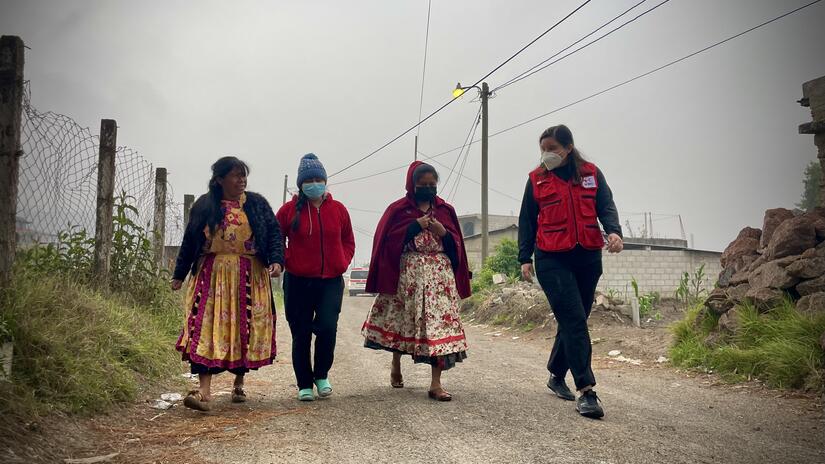Gladis Gómez wears a purple Huipil, a traditional outfit worn by people from the mountainous, western part of Guatemala. The colour represents mourning, as she sadly lost a distant relative a few days earlier.
Despite this, a smile lights up her face—a smile that so many people in her community recognise.
Gladis Gómez smiles as she stands in her home wearing purple in her Huipil, a traditional outfit from western Guatemala.
Photo: IFRC, Guatemalan Red Cross
Gladis is the President of a local health committee in her small village of Xecaracoj. The committee brings together a dozen rural women who have been trained in key health issues by the Guatemalan Red Cross so they can help promote healthy practices in their community.
Together, the women go door to door around their village, sharing knowledge on how people can prevent common diseases and deaths, especially among children.
This work is vital. Guatemala has one of the highest rates of child malnutrition in the world, and more than half the population live below the poverty line. The COVID-19 pandemic also took a heavy toll on the country – with 20,000 people dying from the disease within 3 years.
‘’We have spread the new knowledge given to us by the Guatemalan Red Cross to inform men, boys and girls about things as simple as hand washing, cleaning our homes and our streets, and the importance of breastfeeding and nutrition.”
“We now know that healthy habits make the difference between having a strong and healthy community or continuing to take our babies to the hospital,'' says Gladis.
A Guatemalan Red Cross worker trains the local health committee in Xecaracoj on key health education messages and provides them with water, sanitation and hygiene supplies to distribute.
Photo: IFRC, Guatemalan Red Cross
Juan Poyón, Epidemic and Pandemic Control Technician for the Guatemalan Red Cross, says he’s learned a lot from the health committees, like the one run by Gladis, and has used the women’s local knowledge to guide and improve their support.
“We identified key issues, for example, that their priorities were the prevention of COVID-19 or malnutrition. Today, with the committees already trained, we identified that the women wanted to reach more people, in fact, they prioritised radio, information kiosks or messages via WhatsApp as the best channels to share their knowledge more widely,” explains Juan.
Gladis and a group of women from the local health committee in Xecaracoj stand hold a group meeting and provide suggestions to the Guatemalan Red Cross via a suggestion box.
Photo: IFRC, Guatemalan Red Cross
To share these valuable community insights even further, the Guatemalan Red Cross connected the women-led health committees with the country's Ministry of Health—which has proved to be an eye opener for the national authorities. They’re now working together to improve community health across the country.
Ana Gómez, Epidemiologist at the Guatemalan Ministry of Health, explained:
“We have worked with the Guatemalan Red Cross to identify people’s needs, respecting the diversity of the population. We learned about, and welcomed, women's points of view to strengthen community health, and along the way we confirmed that their role is key.”
“Women are the main users of health services. They also play a fundamental role in the education of the next generation who will be in charge of the country. Involving women ensures positive behavioural change in families and communities, and therefore contributes to improving Guatemala's health,” says Ana.

Three women from the local health committee in Xecaracoj, Guatemala walk in company of an IFRC staff member.
Photo: IFRC, Guatemalan Red Cross
Spending time with Gladis, it’s clear to see that she takes a lot of pride in her work, and that she and her fellow health committee members are happy their voices are being heard.
As she sits and weaves herself a new corte – a traditional Mayan skirt – she points to the yellow stripes that represent hope.
“Tomorrow I will wear a yellow Huipil to represent the colour of life, the rays of the sun, and corn,” says Gladis.
“The women of this community are special, very special, because today we have the knowledge to protect life.”
Gladis holds up a corte - a traditional Mayan skirt - she is weaving which features a yellow striped band, representing hope.
Photo: IFRC, Guatemalan Red Cross
--
The promotion of these local health committees in Guatemala is part of the epidemic and pandemic preparedness pillar of our Programmatic Partnership with the European Union.
So far, 1250 families in the rural area of Quetzaltenango, western Guatemala, have received valuable and trusted health advice provided by the local health committees.
Implemented by 24 National Red Cross and Red Crescent Societies around the world, including in Panama, Guatemala, Honduras, El Salvador and Ecuador in the Americas, the Programmatic Partnership helps communities to reduce their risks and be better prepared for disasters and health emergencies.
The IFRC will continue to strengthen the capacities of communities in Guatemala to prevent pandemics and epidemics; and to encourage more women to take leadership positions so they can have a profound, positive impact on the future of their communities.

